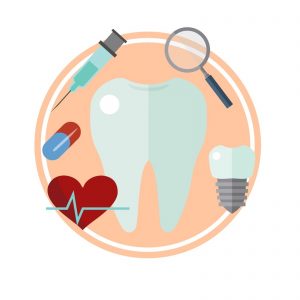Oral and dental health should start from day one. The steps you take toward your baby’s good oral and dental health are the building blocks for developing good oral health habits.

From birth, a parent or caregiver should wipe down the soft tissues inside the baby’s mouth after feeding. Use a clean, damp cloth or gauze and gently wipe the baby’s gums, inside of the cheeks, and tongue. This removes and inhibits the growth of bacteria inside your baby’s mouth. Doing this also gets your baby used to having his or her mouth cleaned. This all becomes even more important as your baby gets ready for teething. It’s important to give your baby’s new teeth a clean environment to grow.
All children are different, but most babies will have their first tooth by around six months of age. Continue wiping the soft tissues inside baby’s mouth and start wiping or brushing baby’s new teeth. Just as with older children or adults, baby teeth will develop caries and decay if plaque and food particles are not removed. By the time your child is three years old, he or she will have a complete set of 20 primary teeth.
Once the first tooth appears, schedule an appointment to bring your baby to the dentist so he or she will learn to be comfortable at the dental clinic. The dentist will give you helpful tips for keeping your child’s teeth healthy. Continue bringing your child to the dentist every six months for a cleaning and checkup to keep your child’s teeth happy and healthy.
Why should we be worried about primary (or baby) teeth when they will be replaced in a few years by permanent teeth?
- It is important for your child to develop good habits for oral and dental care. If a child does not take care of their primary teeth, why would you expect them to take better care of their permanent teeth? Make toothbrushing and flossing a regular part of your child’s routine.
- Primary teeth are placeholders for permanent teeth. If a child were to lose a baby tooth early due to decay, it might cause the neighboring teeth to shift, leaving no room for the permanent teeth to grow.
- Poor dental hygiene at any age will lead to growth of bacteria and tooth decay. This will lead to pain and infection that will not only affect your child’s mouth but also their overall health.
Tips for toothbrushing:
- Always choose a toothbrush with soft bristles.
- Always use a toothpaste with 1,000ppm of fluoride. For a child up to three years old, use just a smear of toothpaste, about the size of a grain of rice. For children aged three and above, use a pea sized amount of toothpaste, but make sure they spit it out.
- When brushing, place the toothbrush at a 45 degree angle to the gumline.
- Brushing should take about 2 minutes. You can choose a song of about 2 minutes to play while toothbrushing to make it more fun and so everyone knows when your child may be done cleaning his or her teeth.
- Don’t forget to brush at least twice a day and floss once a day. Flossing should start once your child has teeth that are very near or touching each other.
- Children should be supervised that they are brushing their teeth properly until they are at least about eight years old. You can brush your teeth together to provide a good example to your kids.
How to help baby deal with the pain of teething:
- Avoid teething gels and creams. Although they have been used for many years, recently studies have shown that the ingredients in these gels may cause side effects that are harmful to your baby.
- Give cold teething toys to chew on. Keep these in the refrigerator, not in the freezer, and clean them often.
- You may use a teething brush or washcloth and apply pressure by rubbing the gums.
- Follow the advice of your pediatrician when giving over the counter medication such as acetaminophen or paracetamol to help with the pain.
